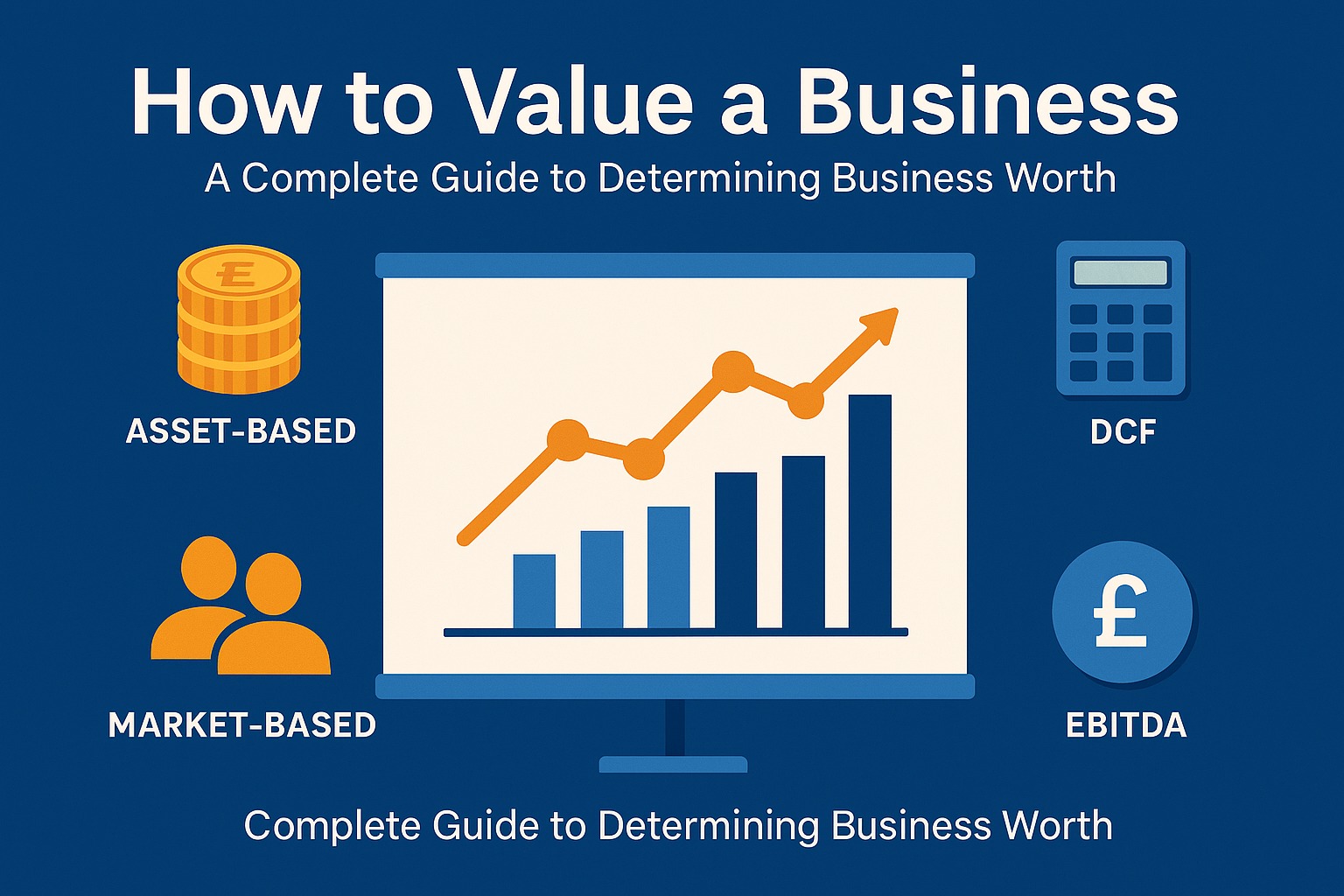How to Value a Business: A Complete Guide to Determining Business Worth
Learn accurate, practical methods to assess what your business is truly worth – whether you're buying, selling, or investing.

Introduction
Knowing how to value a business is essential for entrepreneurs, investors, accountants, and anyone involved in running or buying a company. Whether you’re planning to sell your business, attract investors, or understand its position in the market, valuation gives you clarity and power.
This article will walk you through professional methods of business valuation, explain real-world examples, and show how different financial metrics contribute to a business’s overall worth. Whether you’re handling a small business valuation, a startup valuation, or a tech company valuation, this guide is tailored to help you.
What Is Business Valuation?
Business valuation, also called company valuation or business appraisal, is the process of determining the monetary value of a business. This figure isn’t just a guess—it’s based on a mix of the company’s assets, earnings, industry comparisons, and growth potential.
Valuation matters in many scenarios:
-
Selling or buying a business
-
Seeking investment
-
Partnership changes
-
Divorce or inheritance settlements
-
Tax reporting to HMRC or legal authorities
Why Accurate Valuation Matters
Knowing your business worth does more than prepare you for a sale. It:
-
Helps secure fair investment deals
-
Assists with retirement or succession planning
-
Provides a benchmark for business performance
-
Enables better financial and strategic decisions
A proper valuation for tax purposes is also necessary to comply with UK law, particularly in inheritance tax valuation or shareholder disputes valuation.
Methods for How to Value a Business
There are three main business valuation methods professionals use. Each suits different business types and purposes.
1. Asset-Based Valuation (Cost Approach)
This method calculates a business’s net asset value (NAV) by subtracting liabilities from the total value of assets.
Use this method when:
-
The business has significant physical assets (e.g. real estate, equipment)
-
You need a “liquidation” value
Types:
-
Going Concern Value – assumes the business continues to operate
-
Forced Liquidation Value – values the business as if it will close and assets are sold quickly
It’s common in retail business valuation, manufacturing firms, and franchise valuation.
2. Income Approach (Discounted Cash Flow – DCF)
This method focuses on future income. It estimates how much money the business is expected to generate, then uses a capitalization rate to discount those earnings to present-day value.
Key metrics used:
-
Free cash flow
-
EBITDA (Earnings Before Interest, Taxes, Depreciation, and Amortization)
-
Return on Investment (ROI)
Discounted Cash Flow (DCF) is often used in tech company valuation and professional practice valuation, where future growth is more important than current assets.
3. Market-Based Valuation (Comparable Company Analysis)
This method compares your business to similar companies recently sold. It’s based on:
-
Earnings multiples
-
EBITDA multiples
-
P/E ratio (Price-to-Earnings)
-
Revenue multiples
Market comps are useful when you can find reliable data about other similar businesses in your industry and region.
Real-Life Example: Small Café Valuation
Imagine a local café with:
-
Annual EBITDA: £60,000
-
Industry EBITDA Multiple: 3.5x
-
Estimated Value = £60,000 × 3.5 = £210,000
But what if this café owns its property (worth £150,000) and has no debt? An asset-based valuation could push the value even higher.
Always consider both earnings and assets when deciding which method fits best.
Financial Metrics That Matter in Valuation
To understand how to value a business, you need to understand financial terms like:
-
EBITDA: Measures operating profit without the impact of debt or tax
-
Book Value: Value of assets minus liabilities
-
Enterprise Value (EV): Includes market value and debt
-
Free Cash Flow: Real profit available to owners or investors
-
Capitalization Rate: Used in DCF to assess investment risk
These are often included in valuation spreadsheets, online valuation tools, or valuation templates.
Valuation Tools and Resources
If you’re not ready to hire a professional yet, try:
-
Business valuation calculator
-
Business valuation software
-
Valuation spreadsheets (Excel or Google Sheets)
-
Valuation books and online courses
These tools are especially helpful for startup valuation, where future earnings are speculative and assets may be minimal.
What Affects Business Worth?
No two businesses are the same. Your value depends on:
-
Industry trends
-
Customer loyalty
-
Brand reputation
-
Technology or patents (intellectual property)
-
Staffing and management team
-
Market conditions
For example, a SaaS business may have high value due to recurring revenue, even if it has fewer tangible assets.
Common Mistakes in Valuing a Business
-
Relying on revenue alone (without considering profit)
-
Ignoring debt or liabilities
-
Using outdated or irrelevant market data
-
Overestimating goodwill without evidence
-
Not adjusting for seasonality or unusual years
If in doubt, always compare multiple methods and consult with an expert.
Quick DIY Valuation Formula
Here’s a simple formula you can use to get a rough idea of your business value:
Business Value = EBITDA × Industry Multiple
Example:
-
EBITDA = £100,000
-
Industry Multiple = 4
-
Estimated Value = £100,000 × 4 = £400,000
This doesn’t replace a professional appraisal but offers a starting point.
FAQ – How to Value a Business
Q1: What is the most reliable method to value a business?
A: For most profitable businesses, Discounted Cash Flow (DCF) offers a realistic and data-driven estimate. For asset-heavy companies, asset-based valuation works best.
Q2: Can I value my business without profits?
A: Yes. Use asset-based or market-based valuation if there’s no steady profit yet—especially in startup scenarios.
Q3: What is a good EBITDA multiple?
A: It varies by industry. Retail may use 2.5–3.5x EBITDA, while tech companies can go as high as 5–10x.
Q4: How do I find my industry multiple?
A: Look at recent business sales in your industry or consult valuation reports. You can also get help from an accountant.
Q5: Do I need to hire a professional for valuation?
A: For selling a business, legal matters, or tax purposes, yes. For planning or internal strategy, tools and spreadsheets may be enough.
Conclusion
Learning how to value a business accurately gives you confidence and clarity. Whether you’re planning an exit, pitching to investors, or just benchmarking progress, business valuation is a skill every business owner should understand.
Use the right method—asset-based, DCF, or market-based—based on your business model and goals. Leverage tools like valuation calculators, understand financial metrics like EBITDA, and stay informed about industry trends.
By avoiding common mistakes and seeking guidance when needed, you’ll get a realistic picture of your business’s value—and make smarter decisions because of it.



